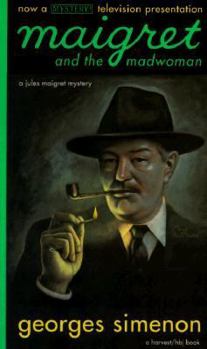Book Overview
"A writer as comfortable with reality as with fiction, with passion as with reason." --John Le Carr When an old woman contacts Maigret, sure she's about to be killed, Maigret has no reason to believe... This description may be from another edition of this product.
Format:Paperback
Language:English
ISBN:0156551225
ISBN13:9780156551229
Release Date:January 1992
Publisher:Houghton Mifflin Harcourt P
Length:176 Pages
Weight:2.55 lbs.
Dimensions:0.4" x 4.2" x 7.0"
Customer Reviews
5 ratings
No motives and few suspects
Published by Thriftbooks.com User , 15 years ago
We all know how paranoia can grip the elderly. So when an 86-year-old lady tells the police that someone is entering her apartment when she's out and moving things around, and that someone may be following her too, can we blame Maigret for being a bit skeptical? Will she have to be murdered before Maigret believes her? This is a low-key case that doesn't make headlines, yet Maigret, once he gets started, gives it his all. There's a secret somewhere, maybe in the keeping of the needy relatives. Yet why rob or kill an old lady when you're going to inherit her money anyway? The Chief Superintendent is at a loss for a motive. The sun shines persistently throughout the story, in contrast with Maigret's lack of inspiration. Once again Maigret is cutting back on alcohol, but he does succumb to a second glass of wine at one point. After all, "Dr. Pardon would never know."
Delightfully old-fashioned
Published by Thriftbooks.com User , 16 years ago
This simple and old-fashioned mystery was a pleasant surprise. There was nothing flashy, or garish, or over-the top about it - a straightforward police whodunit. Some readers might find this a trifle boring - we've gotten so used to multiple storylines and side-stories that it's a little hard to switch gears and wind down to something so basic, but it's worth it. Reminds one of simpler times, and harkens back to the days of Agatha Christie (Poirot, though, not Marple). It's not precisely a solve-it-yourself, but it does give you plenty of food for thought. Even though it's a very short book, the characters are well-written and interesting, giving you even more incentive to at least try to decipher the ending. It's possible, but I think it's more luck than skill if you figure it out. Granted, there are none of the dizzying twists and turns of more 'modern' mysteries, no technology or romance, but it's still very much worth reading for any true mystery fan.
Marvelous piece of work
Published by Thriftbooks.com User , 16 years ago
This is one of those rare detective novels with an excellent plot, well-defined characters, great atmosphere, and in a language without a wasted word. Only Ed McBain, among American detective fiction in the police procedural sub-genre, is a rival. Chief Inspector Maigret is not hard boiled, no tough talking cop, nor is he exceptionally perceptive or brilliant. He just attaches himself to the case and plods relentlessly. Here a tiny, 86-year old widow is murdered, after complaining to the police that her apartment has been very slightly disturbed several times while she was shopping or sitting in the park. No one in authority pays much attention to her until after she is strangled. Why would someone kill such a harmless person? She has no valuable jewelry, no cache of money. Maigret must find the motive and the killer with meager clues. Perhaps the most impressive element of this and other Simenon novels is the economy of language, albeit in translation from the French. There is plenty of detail but without wasting a word. The Simenon books should be studied by crime writers for the narrative technique alone.
Thoughtful Writing
Published by Thriftbooks.com User , 20 years ago
This is a thoughtful well-plotted mystery. The author does a fine job portrayng Maigret, the other detectives, the victim (an elderly lady), her niece and her niece's son. The writing is simple and easy to understand. Simemon does not waste words but he brings the characters to life. The reader will be kept guessing until the end of the book.
Ideal summer vacation reading
Published by Thriftbooks.com User , 20 years ago
Imagine drinking a glass of Calvados. The title is ambiguous. She was a tiny woman insisting upon seeing Chief Inspector Maigret personally. Madame Antoine, aged, having lived in her apartment for a long time, reported that her things had been moved. There is only the key she keeps in her bag. A niece and her son are her only relatives. She is pefectly aware that a young person might consider her mad. The concierge says she is very much like any other old person living by herself. Her clear gray eyes make an impression on Maigret. Then she is murdered, suffocated, and an investigation ensues. The police search and question, after all this is a police procedural. Maigret discovers that the victim had practiced twenty five years of thrift. A character named Le Grand Marcel is brought into the picture.The fineness of the writing (translated?) transcends the genre. Picking up a Maigret novel is a matter of dealing in a brand name consumer good. One is never disappointed. The storytelling is simple, classical, felicitous. Simenon used masterful economy in his art. The short bursts of information create an almost Raymond Carverish style. One is transported to Paris in the Spring. Time spent in the company of Maigret and his gifted inspectors Lapointe, Lucas, and Janvier is a pleasure.




